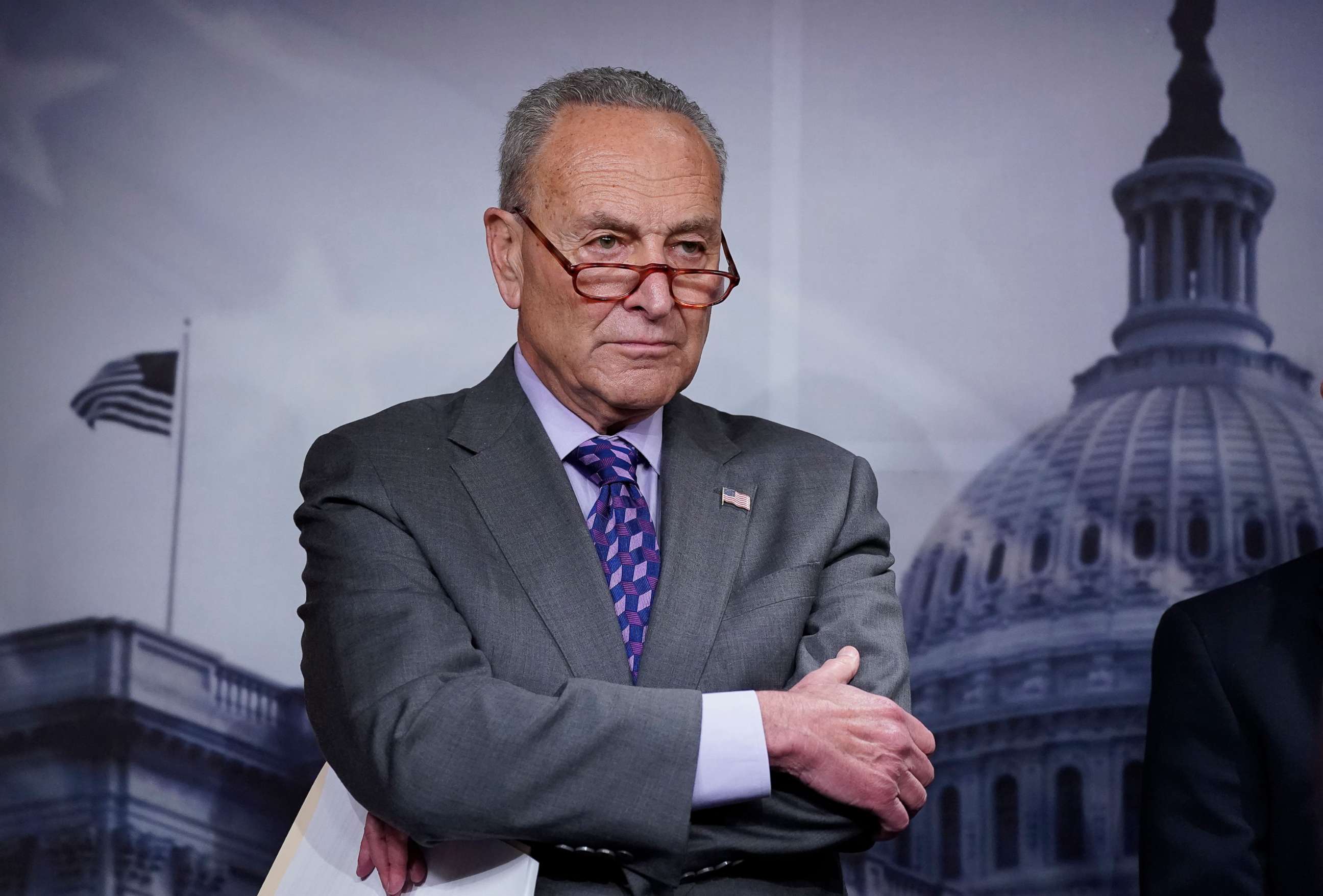
The sweeping reform faces an uphill battle in the Senate.
July 21, 2022, 4:39 PMSenate Majority Leader Chuck Schumer listens during a news conference following a closed-door caucus lunch, at the Capitol in Washington, July 19, 2022.
J. Scott Applewhite/APSenate Democrats on Thursday unveiled their long-awaited marijuana legalization proposal, announcing sweeping legislation that would lift the federal prohibition on the drug and cede power to states to determine how to regulate it.
The Cannabis Administration and Opportunity Act, championed by Majority Leader Chuck Schumer, D-N.Y., Finance Committee Chair Ron Wyden, D-Ore., and Sen. Cory Booker, D-N.J., looks to legalize marijuana at the federal level while creating FDA monitoring requirements like those that already exist for tobacco and alcohol.
"Cannabis legalization has proven immensely successful at the state level, so it is time that Congress catches up with the rest of the country," Schumer said in floor remarks Thursday. "I am proud to be the first Majority Leader ever to say that it is time to end the federal prohibition on cannabis, and this bill provides the best framework for updating our cannabis laws and reversing decades of harm inflicted by the war on drugs."

Schumer did not announce next steps on the legislation or whether he will attempt to bring it up for further consideration on the Senate floor, though he said he hopes to get something done on marijuana "this year".
Voter support for legalization is growing. According to April reporting by 538, a majority of registered voters in all 50 states now favor making cannabis legal. Eighteen states, plus Washington, D.C., have legalized the recreational use of marijuana for those over 21.
"I'd ask my colleagues in the Senate to think long and hard about what keeping the federal government stuck in yesteryear means for public health and safety," Wyden said in a statement. "By failing to act, the federal government is empowering the illicit cannabis market, it's ruining lives and propping up deeply rooted racism in our criminal justice system, it's holding back small cannabis businesses from growing and creating jobs in their communities. Cannabis legalization is here, and Congress needs to get with the program."
But Congress may not be as ready for a federal change. If Schumer does try to move the legislation forward it faces an uphill battle in the Senate. At least 10 Republicans would need to support the measure for it to pass, and not all Democrats would necessarily back it either.
Still, proponents of the legislation say the simple introduction of the bill is a step in the right direction.
"I'm very excited about this day, but it also now gives us momentum to get something done," Booker said, noting that the bill sponsors are looking for the best path to move the legislation forward.
"I want to stress that this is the beginning of the legislative process, not the end. We are going to work hard to create support for our bill, and I hope we can make more progress towards cannabis reform in the future," Schumer said.
Lawmakers first introduced a discussion draft of the bill last summer after Schumer branded legalization as a legislative priority for Democrats. Over 1,800 comments later, the senators unveiled a bill today that aims to attend to concerns among both Democrats and Republicans about regulating marijuana.
The bill includes a host of pubic safety measures and regulations, modifies tax policy on marijuana, requires additional federal research on the impact of marijuana use and removes drug testing for federal workers in most cases.
But anti-legalization advocates fear the newly-introduced legislation does not do enough to regulate potency of cannabis, and could pose a threat to children who might be more easily able to access the legalized drug. Randi Schuster, an assistant professor at Harvard Medical School at the Center for Addiction Medicine, said at a press conference Thursday that the legislation does not do enough to set limits on products that might be appealing to kids and teens.
"We are in a position where policy has far outpaced the science, and making public policy decisions that are not aligned with science poses risk for quite a serious health concern," Schuster said.